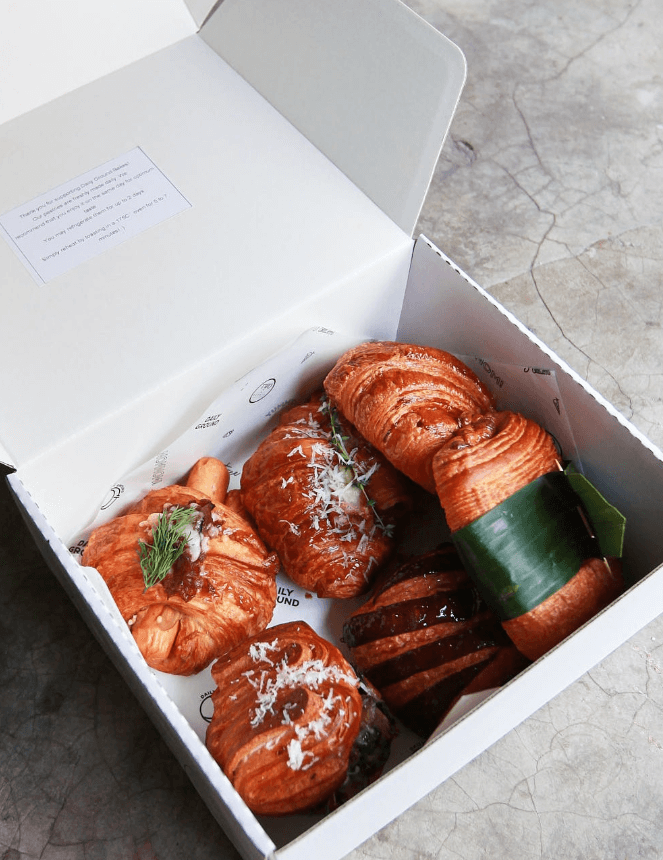Understanding the Difference Between Frozen, Par-Baked and Fresh Pastries
Pastries might look similar on a platter, but the way they’re made (and when) can change everything. Whether you’re serving morning croissants in an office pantry or supplying tarts for a hotel buffet, the format you choose matters. And if you're running a business that serves them, you’ve likely come across these three options: fresh, frozen and par-baked.
Each one comes with its own pros, trade-offs, and ideal use cases. At Two Bakers, we’ve spent years working behind the scenes with hotels, cafés and corporate clients. What started as a small café has evolved into a full-fledged wholesale operation, built around helping others serve better pastries with less hassle.
Let’s look at how these three formats actually work and when they make the most sense.
Fresh Pastries: Peak Flavour, High Commitment
These are the real-deal, made-from-scratch kind. Nothing frozen. No shortcuts. The dough is prepped, proofed, baked, and served all within the same window of time.
You’ll find fresh pastries at boutique bakeries, specialty cafés, or exclusive events. The kind of places where the flakiness of the crust matters just as much as the coffee it’s paired with.
Why People Love Them
Best aroma and texture
Look artisanal and handcrafted
Zero compromise on taste
However, do note this: these take time and skill. You need a team that knows how to work with butter-rich doughs and run a tight kitchen schedule. There's also the shelf-life to think about—these don’t hang around. By the end of the day, you either sell out or throw up.
Best For
Cafés that bake on-site, premium caterers, or one-off events where everything needs to impress.
Frozen Pastries: Ready When You Are
These are prepped in advance and stored in a deep freeze; either baked and then frozen, or raw and frozen. You pull them out as needed, reheat or bake, and serve.
Why People Love Them
Flexible production
Great for stocking up
Minimal staff training needed
They’re a lifesaver in environments where the foot traffic is unpredictable or where staff turnover is high. You can serve pastries with almost no baking experience—just reheat, plate, and you’re good.
But there’s a reason why some chefs avoid them. You don’t always get that same texture. The flakiness might dull a bit. The crust may not rise the same. And if you don't reheat properly, it’s easy to end up with a soggy centre or overly crisp shell.
Best For
Coffee kiosks, office pantries, chain outlets, or any place that values convenience over complexity.
Par-Baked Pastries: Half the Work, Still Feels Fresh
These sit right in the middle. They’re baked just enough to hold their shape, then frozen. When you need them, you finish baking on-site. It gives the illusion of being made from scratch, without the full workload.
Why People Love Them
Smell and texture of a fresh bake
Shorter prep times
Less stress on your kitchen staff
Think about that hotel buffet where pastries come out warm at 7AM. Or the business lounge that always smells like croissants. Chances are, they’re working with par-baked doughs.
You still need an oven and a bit of timing to get it right, but once you get the hang of it, it becomes routine.
Best For
Hotels, airports, large offices, or anywhere you want freshly baked pastries without hiring a pastry chef.
What Works Where?
For Corporate Pantries
Par-baked is the sweet spot. Staff can finish baking each morning, and the space smells like a bakery by 9AM. No pastry chefs needed—just someone who can work a timer.
For Chain Cafés
Frozen makes more sense here. You want consistency across multiple locations. You don’t want to worry about different teams baking different results. Just heat and serve.
For High-End Events
Go fresh. Yes, it’s more work. But if you’re serving at a wedding, product launch, or luxury pop-up, people will notice the difference and expect it.
For Hotels
Par-baked all the way. Timed batches in the morning, flexibility throughout the day. Plus, guests get the fresh-baked aroma without knowing the dough was frozen yesterday.
A Few Things to Think About Before Choosing
Space
Do you have room for a freezer? If not, frozen’s off the table.
Staff
How much baking experience do they have? Fresh might be out of reach for smaller teams.
Volume
Are you serving 50 people a day or 500? Your answer may swing your choice more than taste alone.
Quality Expectations
Is this a grab-and-go situation, or is your customer expecting Paris-level pastries? Not every setting needs that level of finesse.
Final Thoughts
Fresh pastries are wonderful—when you’ve got the space, skills, and staff to pull them off. Frozen pastries are reliable and cost-effective, especially in high-volume environments. And par-baked? They’re the happy middle ground.
The best option depends on what your business needs most: flavour, speed, or flexibility.
At Two Bakers, we’re happy to help you figure that out. And when you’re ready, we’ve got trays of pastries ready to roll—especially if you want fresh with the ease of par-baked and the reliability of frozen.
Get in touch for wholesale and corporate pastry needs.



